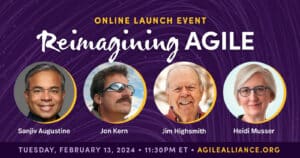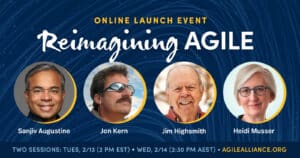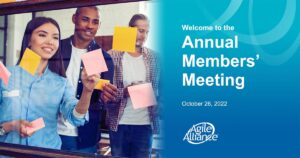Dr. Dave: So hello and welcome to the KnolShare with Dr. Dave podcast. I’m Dr. Dave Cornelius, your host. My conversation is with Jenny Tarwater, an international speaker, agile coach and trainer. My first conversation with Jenny about diversity, equity and inclusion, DEI, was in San Diego, California, 2018 at the Agile 2018 conference. We were in an international group discussing DEI. So I want to say welcome Jenny. And I would just like to just say thank you for being a partner for BIPOC individuals in this social injustice struggle. And I’m really grateful that we’re working on a conference together. So tell me, Jenny, what’s been going on lately?
Jenny: What’s been going on lately? Staying at home, wearing a mask. It feels like I live a lot in this little space right here in front of my computer. We were lucky enough, my husband and I are both a hundred percent work from home and my daughter was a hundred percent school from home for a while. So we’ve been doing that. Doing a lot of coaching with clients, agile coaching. Trying to do some upscaling with… Or coach training and Kanban flow metrics, the normal kind of agile stuff.
Dr. Dave: Yeah. That’s interesting. So let’s talk about some of the social justice challenges that affected many people globally. How is it affecting you and your family?
Jenny: Well, I have to say my family checks all the privileged boxes. So it impacted me less directly than others. But it has certainly changed a lot of my perspective and where I want to spend time and energy. And thinking about how I might contribute to a positive change. It’s interesting too when I think about when I said we check a lot of privilege boxes. I thought about this the other day and I couldn’t believe it. My husband went to the same high school as two sitting senators.
Dr. Dave: Wow.
Jenny: Right. I mean, that’s right. Tim Kaine and Josh Hawley. And I’m like this… That’s saying a lot. After the horrible events of this year, which we know those events were not unique to this year. I’m just really glad that the conversations have really come to the spotlight to the forefront and I’m having a lot more of those conversations.
I had already been quite surprised in 2016 with some of the biases that I didn’t know my friends and family had. So I had already gone through a little bit of shock then and thought that I was being more proactive and trying to educate myself more. But 2020 was even a much bigger leap. And so I think the biggest, biggest impact for me is that I have a much different dividing line of tolerance now. I can have zero tolerance for folks that don’t want to learn and improve. And willful ignorance is not acceptable to me anymore. Right? So I don’t want to share space and energy with folks that can denounce someone else’s lived experience and is not willing to jump into the game of making the world a better place.
Dr. Dave: Well said. So what awareness are being discovered based on some of the recent experience, especially with the upheaval at the US Capitol. It has just blown my mind and just going like, wow, what other awareness’s that you, I, are really going through at this moment? But how about you? What has come to mind for you?
Jenny: Well, the US Capitol, that was, again, another horrific day. Today’s the day they acquitted Trump, which, again, was not that shocking, but still disappointing. And when I look at the videos of that day, what really impacted me… The violence, of course. I mean, it was awful. But the choices of clothing that folks wore, right? The logos, the hate that was filled with the statement that they were making. Right? I mean, I don’t even want to know the phrase that they use. There’s a bunch of initials about the Holocaust. And they built a stage with a noose and the gouging [inaudible 00:05:34]. I mean, it’s hard for me to reconcile that kind of hatred and those choices those folks are making with the humanity I know that can exist. And so I don’t think that hiding our eyes in the sand is going to help.
And so I think there’s something about really continuing to be exposed to that. And so I’m trying to reconcile. I just said a minute ago that I have zero tolerance. I don’t want to have these folks in my space taking up energy. But I also don’t want to become blind to it. Right? So I’m kind of battling. And this sounds so silly, but should I stay friends with people on Facebook that espouse things that I completely disagree with? And when do I step in and say something versus when is that a futile attempt and such. So, yeah. I think that there’s a lot of self-reflection that I’m doing on what role I can most have in these conversations. And again, to the end of making the world a better place. Not just getting in fights, not getting an argument.
Dr. Dave: Right, yeah.
Jenny: That’s not useful.
Dr. Dave: Yeah. It’s not helpful. But as a parent, what are some of the conversations you’re having with your daughter about social justice to help her relate to people that may not look like her?
Jenny: Yeah. Right, right. Well, no, that is a place where I’m pretty confident in what I can do and what my role is. And I take that very seriously. And thank you for asking the question. My daughter and I, and my husband, but I think for even my daughter and I, we talk about this topic, these topics a lot. We did not hide anything from her last year. Now, I did not let her watch George Floyd’s murder. I thought that was too much for a ten-year-old. It’s too much for me, I’ll tell you that.
But she knows that it happened. We’ve had lots of conversations about it. We live in a pretty diverse area. And I would say, actually, our grocery store looks less like us than… Well, her school though, it’s interesting. She has only one black child in her class. Having listened into a lot of her school from home though, I am so proud of the framing that they did on the history of civil rights. And when things were in the news, how they were approaching that with her.
Two years ago, in third grade, they had to do a project on a famous American. And when I went in and I saw the display, it was almost 50% minority, BIPOC figures. Right? So out of the class where there was one black child, where they were looking toward inspiration was much more diverse.
My daughter though, I do want to point out. So we do have a lot of conversations. She notices my biases and calls them out, which I think is wonderful. And because there’s things I don’t realize that I say, especially around gender and sexual identity. That this is a boy show. Right? And she’ll call me out on that. But yeah, I mean, just very open and honest conversations with her. And I know that she has them with her friends. I don’t know that we were doing that when I was 10. I don’t think we were.
Dr. Dave: Different times. Different times for us to be intentional about what’s going on in our lives.
Jenny: Yeah.
Dr. Dave: So let’s talk about our community, our agile community in our tech space. What do you see going on there that’s making you feel uneasy? What do you see?
Jenny: Can I say all of it? And then next question.
Dr. Dave: No, I would want like… Even if you pick one, one thing. One thing.
Jenny: Yeah. Well, so one of the things that I started doing a few years back, and at the time I was more focused on gender. And I started, when I was in any kind of space, I would just count. And I would say how many males are here versus the rest of the group. And whoever had convened that space, I would show them the counts. Especially if it was really off balance. Some folks are a little bit defensive, hey, well I can’t help it. I can’t pick who comes to my conference session. And I can’t pick who applies for our jobs. I said, yeah, you can. You can influence that. There’s something that you’re doing that’s inviting this or disinvesting folks. And so I want to expand that and say how frequently I am in spaces where everybody looks like me.
Dr. Dave: Yeah.
Jenny: Or that by far the majority. And what’s interesting about that is, Dr. Davis, as you know, I’m trying to put myself in other spaces where that is not the case. And it’s overwhelming. Back to my 10-year-old, there’s been a couple of things that I’ve done and I’ve called her over to my Zoom screen. And she looks, and she’s like, oh yeah. Like I can tell you’re in a different kind of meeting, Mom. And I think that’s awful. And so that awareness is good. And I have been thinking recently that I’m going to be more proactive about talking to people that convene space on a regular basis to see if we can have a conversation about how to create more invitation and to be more deliberate. Even if that takes extra work, it’s well worthwhile,
Dr. Dave: I would say so. So this is for you personally, what actions are you taking personally to improve opportunities for black, indigenous, and people of color, BIPOC in the agile community? I think you just touched on it, but I think there’s other things going on.
Jenny: Yeah, sure. Yeah. So, like I said, I’m trying to… We’re Agilist, right? So we try to limit with, and I think we’re all pretty bad at it. But one of the filters that I’m using right now is if unless something is just going to take an hour or two of time, I am not volunteering or working with things that are not in service of improving opportunities for BIPOC community. Right? So all of my, the things that I’m volunteering for right now, it has to include some elements of that.
And the other issue, I’m the director of launching new voices for women in agile, which was a program that we started a few years back, maybe agile 2017, I think. Where we are creating an on-ramp for new speakers for agile conferences. And we partner with different agile conferences. And we’re starting to partner with meetups and such. And even though with this explicitly called women in agile, we’ve always had as one of our values that we want to help all of the groups that are underrepresented. And I think historically if we look back at our choices, those are ones that I would be proud of.
So the other aspect of women in agile group that I’m really happy about is last year in the middle of the summer, when our event happened, we shifted and ask our dear friend, April Jefferson, to be involved with shifting to where we could create a space, really to talk about some of the things that were happening. It was a phenomenal event. I know that I heard a lot of things that I had never heard before. Like we had a panel of black women, and it was pretty shocking. Getting a little worked up here.
Dr. Dave: That’s okay.
Jenny: The thing that was more shocking for me was I heard repeatedly that they had not had an experience like that, a space like that before, where they had felt safe to have some of these conversations. And we just need more of it. We need more. The agile alliance doing the series of events last year I think was also helpful. Several good initiatives came out of that. I want more of that. I mean, I think there was maybe four or five. I can’t remember exactly sessions that I was helping to facilitate last year. But why are we not doing non cadence? Right? Let’s be doing that every quarter and generating even new experiments. I think this series might’ve come out of some of those conversations. I can’t remember for sure. But there are a couple of really good things like the agile in color and yeah.
Dr. Dave: Yeah. Melanated Agile was another one. Yeah, yeah.
Jenny: Yeah, there you go. Yeah, yeah, yeah.
Dr. Dave: I figured that’s what you were searching for.
Jenny: Yeah. Thank you. Thank you. I love that word melanated. I need to get better at… I feel uncomfortable with that word. And I think the final thing is that I’m personally doing, and I know this is going to sound very passive, and I’m uncomfortable with that. I want to be doing more actively. But I’m really trying to educate myself and listen and listen more and more. There’s a couple of classes that I would recommend and a couple of people that I’ve started following that I’ve learned a lot from. And that’s making me see sometimes where I might be closing opportunities without realizing it. And the listening part is really interesting.
I can remember even recently, a couple years ago, something happened at an agile conference and my friend said, oh well that happened because I’m black. And I said, no it didn’t. Nuh-uh (negative). Come on. No it didn’t. And they looked at me like, excuse me. Like I live this all the time, 24/7. That was because I was black. I can tell you. You don’t get to filter that. And I realized even how much of that are we doing. The day after that, and I don’t really want to describe the situation that happened, there was somebody was excluded from something and said, well, you know…
So the next day I did a little experiment. And I looked around for anybody that was off to the side that wasn’t joining in, that didn’t look like me. And I went up and I started conversation and it was a wonderful evening. There were some interesting answers to I’m like hey, having fun hanging out back here. Like, yeah. Why are people over there doing that? Right? And so I felt like I was kind of making some connections for folks and it was… But that all came from that one conversation, that one conversation that said I wasn’t included because I was black. And that I hadn’t seen. That filter then changed for me and it gave me some, it gave me a path to something I could do.
Dr. Dave: That’s great. But I’m going to ask you to dig a little deeper here, Jenny. Jenny T. Jenny T or Jen T. So if there was a question you would like to ask about how BIPOC individuals are feeling, what would that be?
Jenny: If there is a question that I would like to ask about how BIPOC individuals are feeling?
Dr. Dave: Yeah, what would that question be?
Jenny: It’s going to sound like a consulting answer. But what question do you wish I was asking?
Dr. Dave: This is not-
Jenny: What do you know that I don’t know? That’s what I’m saying my answer is.
Dr. Dave: Oh that’s your question. I thought you were asking me. I’m like what.
Jenny: Yeah. Nope. That’s my question. I don’t know the right questions to ask, to be honest. Because that’s the bias, right? And so I want to invite the unexpected and the learning that would come from asking what am I not asking? What do you want to talk about? What feelings is it that you want to share or expose? What am I doing that could create more space for that to happen? Right?
Dr. Dave: Damn good question. I like it. I like it a lot. So let’s talk about what would you recommend as a course of action to bring about diversity, equity, inclusion, and belonging in the agile community for BIPOC professionals?
Jenny: So I said it, more education. Right? So there is a lot of good opportunities out there for that. Tricia Broderick has got a great class about microaggressions that I recommend. I’ve actually taken a couple of times, assisted with one. I learned a lot and I have seen opportunities that came from something as simple as expanding my Twitter, folks I follow on Twitter. Now they call it black Twitter. Whole conversations that I didn’t know were happening. And occasionally there’s opportunities or requests that come from that. Which leads me to my first thing. When called, answer. Right. When somebody says I need your help, you have a spot here, try not to question it as much as to do it. And I’m laughing Dr. Dave, because I hate when you asked me to do this podcast. I’m like I don’t think I have… I don’t know what I have to add here. I don’t want to do that. You said, no, I want you to. Trust me on it. And I said okay.
I had to think about that a little bit. And I had to reconcile. When I see the folks that you’ve had on this series, I’m in awe. Like there’s a lot of folks that are very actively doing things in the social justice area. There’s a lot of folks that were very vulnerable and exposed their history, their experiences on this podcast. And I was trying to figure out what my contribution could be. Why am I on here? And I just I think what I am comfortable with is that I’m not credentialed like that. And that’s the example that says everybody can be doing more, right?
Everybody should be getting more educated. Right? Everybody should be listening. Everybody should be answering the call. Right? Especially those of us that have privilege, how can we amplify for others? And so that’s what I think that I can bring along. And I’m a social person, raging extrovert, the connector and such. But I don’t have a long history of research and study in this area. I just want to be a good person. And so I guess that’s the challenge that I would put out there for folks is just to say, bring your authentic self. Bring who you are to this space and do what you can.
Dr. Dave: I can’t say it better. That’s really important. And I just want to say thank you. Thank you for stepping into the agile for humanity conference. You could’ve said no, but you said yes. And you said yes when we did our soft launch in October and you said yes that we’re doing it next week.
Jenny: Yeah. Well I’m very much looking forward to the conference day. Yeah. The soft launch was great. There was a ton of amazing conversations that took place there. Some actions that followed from there as well. Looking forward to this instance and future instances of it as well.
Dr. Dave: Yes. Yes. Thank you so much. So I would like to close by saying thank you for listening to the KnolShare with Dr. Dave podcast. I hope this learning experience will also prompt you to go off and seek more, discover how you can contribute to positive experiences for BIPOC lives. I say it doesn’t take much. All we need to do is to tap into our own humanity. You will find the agile for humanity social justice impact series on the KnolShare with Dr. Dave podcast on iTunes, Google Play, and Spotify.
The agile for humanity social justice and impact series is also on the following website. It’s on the agilealliance.org. It’s KnolSharewithDr.dave.com, grokshare.com, knolshare.org, and also agileforhumanity.org. So I said look for sharing black lives, indigenous, and people of color stories and the agile Alliance website onto the webcast.
I want to give a shout out to my niece, Kyanna Brow-Hendrickson who wrote the music that as the intro and outro.
And this podcast is copy written 2020, 21 KnolShare with Dr. Dave and Dr. Dave Cornelius.
I said until next time be well, stay safe, and connect soon.
This is awesome. Love you, y’all.





